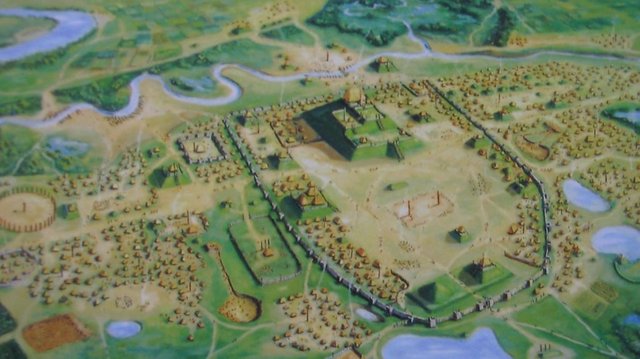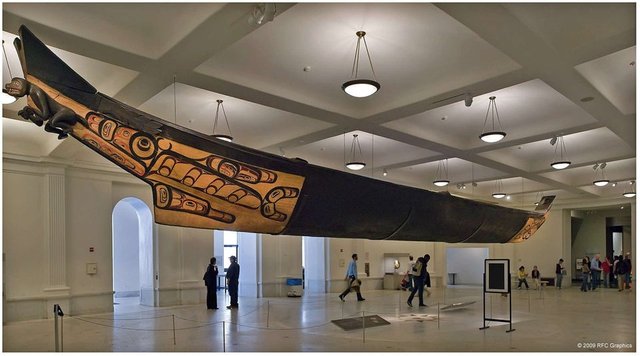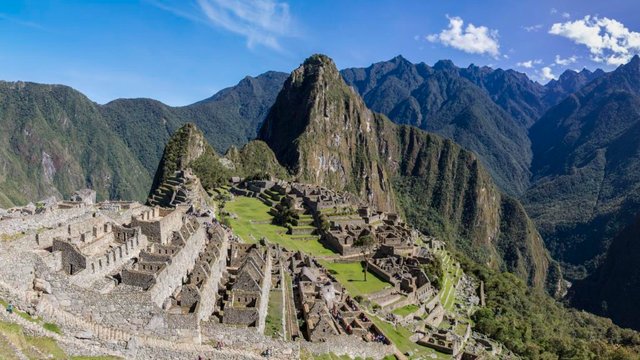Why didn't Native Americans develop sailing, and which peoples almost got there?
For those curious about the History of the pre-Columbian Americas, this is a rather common question. Why didn't Native American peoples develop sailing ships like the Europeans? They had access to large bodies of water, they had organized and centralized States, they surely were capable of building wooden structures and weaving and some of them even had access to metal tools. So why didn't they go beyond primitive vessels like canoes and rafts? Even Polynesian peoples, who were far behind them in many other aspects, built ocean-going ships. What happened?
There are several points to be considered in this question:
First point: Europeans and Middle Easterners were rather an exception than a rule in this regard. Mediterranean sailing tradition developed over the course of millennia of Mediterranean thalassocracies, that is, sea-based empires such as those of Phoenicians and Hellenians. Peoples dwelling in more inland portions of the Eurasian continent, such as Slavs and Mongolians, did not develop sailing either. Other peoples, such as the West Africans and the Chinese, had a more limited seafaring capability mainly because they didn't regard it as something as crucial to the defense of their territories like Mediterranean peoples did. The Mediterranean peoples usually settled on the coast and along large rivers, and ended up developing economies focused on foreign trade by boat. Over time, they developed boats that were capable to travel farther and farther taking with them ever larger cargoes. The largest American civilizations, on the other hand, developed around lakes like Texcoco and Titicaca, so even if they had the tools and good reasons to develop larger ships, they wouldn't have much use for them. Trading between neighbor polities around a lake is something large rafts could handle really well. In sum, even though we are used to associate the sailing ship as a product of the late medieval technology overall, Europeans actually inherited millennia of Mediterranean seafaring traditions.
Second point: European sailing was invented and perfected by Mediterranean peoples from both Europe, the Middle East and North Africa, and as such was a shared trait among these regions. Exchange of knowledge and technology flourished among different peoples, fostering a competitive environment that benefited its development. Commercial and arms race were the main drivers behind the Mediterranean naval technology, the most striking example being that of Rome, who developed a fleet to face its Semitic rival, Carthage. This technological race sped up considerably during the Middle Ages, due to the Muslim expansion, the Crusades, and the birth of the maritime merchant Republics of Italy. Native American peoples, developing in relative isolation from the Old World, did not benefit from this environment of exchange and competitiveness. It's reasonable to assume that whatever seafaring they developed, they developed it at a much slower pace. As they faced no naval threat from their neighbors, they had little incentive to speed up that process. That is, Europeans developed their ships out of necessity to conduct sea trade, defend themselves and attack rivals, a necessity the Americans did not have.
Third point: As said earlier, Europeans, North Africans and Middle Easterners had the Mediterranean to explore as a connection hub, where the occurrence of hurricanes is uncommon and the currents allow relatively easy navigation on every direction. Native Americans, on the other hand, had the Gulf of Mexico and the Caribbean Sea as connection hubs, and both bodies of water are subject to a season of hurricanes that lasts almost half a year. On the other side of the continent, there was the Pacific ocean whose currents mostly blow northward, which severely limits where a sail-propelled vessel can go. Long story short, Americans had to face a an environment that was much more hostile to the development of sailing.
Notwithstanding all these hardships, Karibs and Arawaks settled on islands along the Caribbean sea and are credited with the introduction of the cassava into the South American continent. They developed some complex chiefdoms in the mainland (1000~1500 AD), but those were way too late to develop anything before the arrival of the Europeans. Occasionally, traders living along the Peruvian and Ecuadorian coasts navigated north along the Pacific coast to trade their valuable Spondylus shells, around twice a year. These Pacific traders are credited with the introduction of metallurgy into Mexico, as well as that of axe-monies. As we can see, some peoples did have their reasons to perform sea travels, but those were individual or small-scale endeavors. Which brings us to the last and most important point.
Fourth point: Reasons. Maritime travel developed in the Old World for two main reasons: trading and warfare. Ships were instruments of long range trade and projection of power, which means they were the product of specific sociopolitical arrangements and were subject to a set of political, economical and ideological motivations. This can be seen when we bring Polynesian navigation to the table. Polynesians had a different motivation to sail: alleviate the overpopulation of their homeland islands drove them to navigate farther and farther east to settle newly discovered lands, while keeping contact with other settlements by boat. Their necessity was very different from that of Mediterranean sailing tradition: their boats were made to transport people, fishing and hunting tools and some provisions, and not much more than that. Such a necessity existed among Karibs and Arawaks, but again, the hurricane-prone Caribbean sea wasn't a good environment for experimentation and seafaring was relatively new to them as opposed to Polynesians who had been sailing for centuries.
The most advanced civilization of America, that of the Incas, lacked a market-based economy and relied on what we may call a palace economy: resources were collected by a central government and then redistributed among provinces and family units. There was plenty of land to seed, plow and harvest before long range trade was even considered, not to mention settlement of foreign lands that far off the coast. Andean civilizations had high-yield domesticated crops, advanced agriculture and husbandry. Manpower was aplenty and food was anything but scarce. Even before the Incas, a few powerful polities ruled large swathes of land. Metallurgy was endemic to the Andean region so they could have exported metal ingots and tools along the Pacific coast, but being the most advanced civilization in the whole continent with a food surplus also meant there was little they could have needed to trade it for. Other peoples didn't really have much to offer them other than tropical fruits and fish. Only an imperialist drive could have put them on boats.
Europeans and Easterners, on the other hand, had an older tradition of Statecraft and market economies, were recovering from relatively recent demographic disasters (Mongolian invasions, black death) and faced well-developed neighbors so they had only a few options safer than all out wars: relying on sea trade and looking for whatever unoccupied land they could find beyond known waters. There are also religious factors involved here. Western Mediterranean peoples, both Christian and Muslim, traced their holy sites back to the Middle East and were used to travel there by sea, either for religious pilgrimages or military campaigns. If they were to save their souls and expel infidels from their holy sites, they better get there faster than them and make bigger and better boats. They had a practical reason and an ideological reason to project their power by sea: the profits of long range trade of luxury goods as a source of income to the State, and an expansionist religious worldview that commanded them to spread word about the one true God. Those two motivating factors weren't strong enough in the case of the Incas, but they were almost there. In short, Americans just didn't need ships at that point of their history, but it's likely they would have to develop them later on.
What if they managed to do it?
Let's now tread on Alternate History waters. Which American peoples were the most likely to develop large sea-going ships, if Europeans hadn't messed up with their plans? Given what was seen so far, the following factors can predict the emergence of naval warfare and a merchant fleet:
1 - The need to trade with distant peoples and/or defend against seafaring peoples.
2 - The will to extend one's rule and religious views abroad.
3 - Availability of materials and techniques to build wooden structures and sails of cloth or leather. Metal tools are a nice-to-have.
The most likely candidates are:

Mississippian Culture - During De Soto's expedition in North America, his fleet faced what seemed to be a well-organized, color-coded river fleet sent by chief Quigaltam and composed of several dozen canoes. The important thing here was not the amassing of troops on canoes, which was rather common in South American tribes as well, but the fact that the chief was willing to project his power way beyond the limits of his actual polity to intimidate an intruder, which demonstrates he was used to such practices and that they might have been commonplace among his allies and rivals, something that wasn't seen anywhere else in the continent. Other than one-off attacks on rival tribes or occasional skirmishes on rivers, Americans seldomly left their settlements for long periods of time to give chase to an enemy in waterways. One and three, check.

Northwest Pacific Culture - Haida and Tlingit tribes were among the best canoe-makers of America, and crafted the largest war canoes of the continent. Their canoes could accommodate up to 60 men. In comparison, the Tupis who dominated virtually all of the Brazilian coast, could make canoes that accommodated up to 30 men and that was enough to astonish the Portuguese chroniclers for their capacity to mobilize for war. Besides the size of their canoes, Haida and Tlingit also developed weapons for canoe-to-canoe combat, which were made specifically to damage the opponent's canoe. This is a sign they were in a naval arms race far exceeding that of other peoples in the continent. One and three, check.

Incan Empire - Incas inherited lots of traits from previous Andean cultures such as Aymara, Chimu, Moche, Tiwanaku and Wari. Among the traits they inherited were the totora rafts used to fish and trade along the American Pacific coast, prominently displayed in Moche earthenware. There is evidence of contact between northern Andean traders and western Mesoamerican peoples and also a heated discussion going on about whether Tupac Yupanqui, the Incan equivalent of Alexander the Great, used a large fleet of rafts to reach as far as Galapagos and the Eastern Island (Rapa Nui), as evidenced by the architecure of Vinapu. Definitely, the Incas had a will to expand their dominions way beyond their original territory, evidenced from their swift conquests and their practice of imposing their language and the cult of the Sun-god (Inti) wherever they managed to set their foot, as well as erecting administrative buildings and sending settlers and colonists to the newly acquired lands. Two and three, check.
Posted from my blog with SteemPress : https://renandossantos.com/why-didnt-native-americans-develop-sailing-and-which-peoples-almost-got-there/
Congratulations @renandossantos! You have completed the following achievement on the Steem blockchain and have been rewarded with new badge(s) :
You can view your badges on your Steem Board and compare to others on the Steem Ranking
If you no longer want to receive notifications, reply to this comment with the word
STOPTo support your work, I also upvoted your post!
Vote for @Steemitboard as a witness to get one more award and increased upvotes!
Congratulations @renandossantos! You received a personal award!
You can view your badges on your Steem Board and compare to others on the Steem Ranking
Vote for @Steemitboard as a witness to get one more award and increased upvotes!